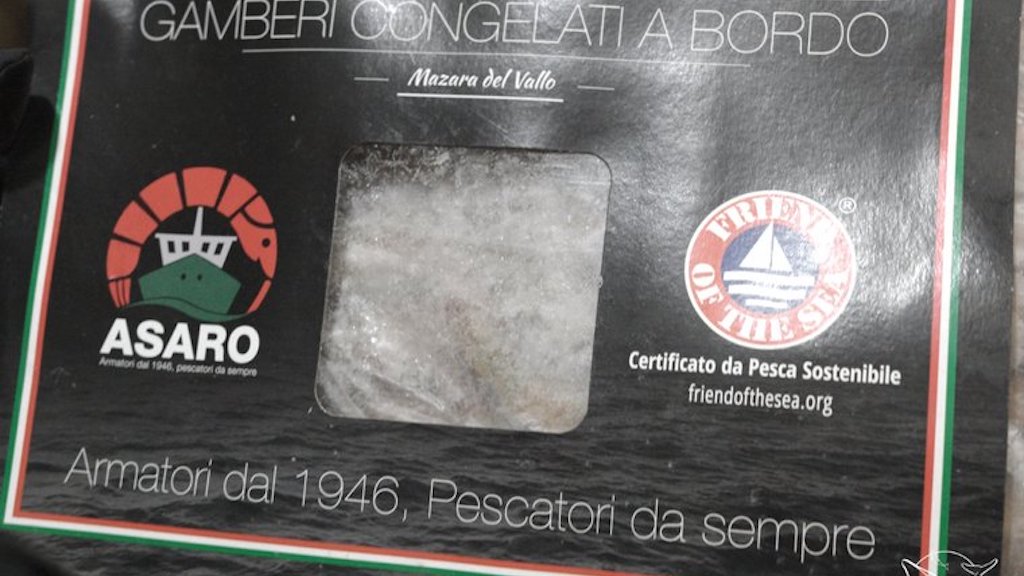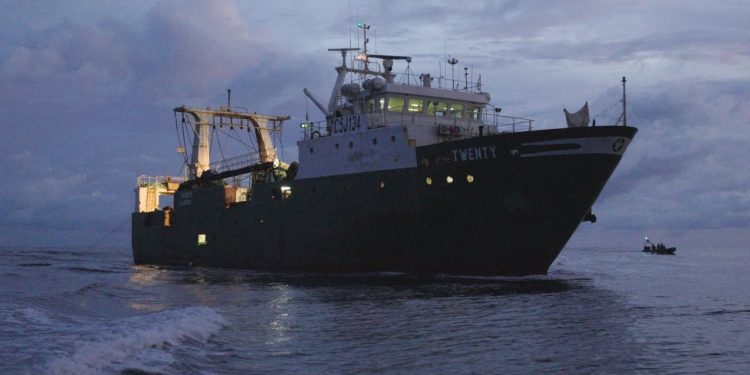The question of the European Commission’s reluctance to take measures over the activities of fishing vessels of Italian origin operating in African waters has been again flagged up by The Coalition for Fair Fisheries Arrangements (CFFA), which asks when is the Commission going to pull its head out of the sand?
A few months ago the authorities in The Gambia arrested trawler Twenty, uncovering a wealth of infringements, starting with illegal gear, failure to maintain a logbook and to use AIS, while also seizing cartons of shrimp falsely labelled as certified sustainable by Friend of the Sea, and believed to be meant for European markets.
CFFA reports that this is just one of a number of vessels owned and operated by Italian company Asaro, and this fleet has a long history of illegal operations on West African waters – of which the European Commission is fully aware, and suggests that there’s a level of complacency taking place.
In 2019, CFFA, along with other organisations, filed a complaint with the European Commission relating to the illegal operations of these vessels in Sierra Leone.

‘Despite months of dialogue with the Commission, nothing has been done. The Commission had informed us that, as part of an audit of the EU’s external fleet (2019-2020), it had started a pre-litigation dialogue procedure (EU pilot) with Italy,’ a CFFA representative stated, commenting that the Commission claimed that ‘the country provided “convincing answers” on the performance of its control system.’
‘We subsequently requested access to the entire document, in the name of the fundamental right of public access to documents held by Union institutions. All we received was a heavily censored report in which we could find nothing of interest. Eventually, the Commission closed our complaint. Yet, these vessels continue to fish illegally in West Africa…’ CFFA’s representative said, commenting that as long ago as 2013, the Sub-Regional Fisheries Commission was already concerned by the same Italian vessels and requested for an advisory opinion from the International Tribunal for the Law of the Sea (ITLOS) on the question of the responsibilities of the Flag State and the Coastal State in the event of IUU fishing. Currently, these vessels do not appear on any IUU list.
According to CFFA, the issue of reflagging EU vessels countries unable or unwilling to control their fishing activities, the difficulty of obtaining information on these vessels’ activities and, in the event of IUU fishing, to make beneficial owners subject to penalties are a weakness in the EU law.
‘Although we have been sounding the alarm for years, these vessels that are repeat offenders continue to slip through the cracks because of regulatory loopholes and the inaction of the European Commission towards its Member States. This type of activity can no longer be tolerated. In the fight against IUU fishing, the EU imposes standards on other States that it should also impose on European beneficial owners, by finding means to make them subject to sanctions,’ CFFA’s representative said, commenting that while implementation of MCS measures is a primary responsibility of EU Member States, the Commission has a duty to ensure that Member States comply with these obligations and must initiate proceedings if they fail to do so.
In addition, the EU has a unique tool at its disposal in the form of the IUU Regulation, which not only concerns external relations with the dialogue and identification procedure of non-cooperating States, but also the EU market. The regulation acts as a framework that prevents the import of IUU fishing-derived products on the European market, notably through the catch documentation scheme (CDS), guaranteeing product traceability. In addition, this regulation requires Member States to take all appropriate measures to identify nationals supporting or engaging in IUU fishing and to take the necessary action.
‘In other words, if the – allegedly “sustainable” – shrimps on board Twenty were destined for the European market, they should not enter it and the operators should be subject to sanctions,’ CFFA’s representative commented, adding that progress has been made with the new EU control regulations. Under review since 2018, this regulation was adopted by the Parliament in October 2023 and entered into force on 1st January 2024 – requiring that Member States to ensure that they have no beneficial owners in fleets operating in pre-identified countries.
The European Parliament explicitly asked the Commission to take measures to put an end to the use of flags of convenience, calling for ‘public access to information on the beneficial ownership of fishing vessels of all flags’ and for the Commission to improve the identification system of vessels engaged in IUU fishing activities so that it is possible to trace the country of origin of the vessel even if the flag state is uncertain and to add vessels where there are proven cases of human rights violations.
‘Monitoring of ships that reflag and their beneficial owners is still widely unregulated under EU law. As a result, these vessels and activities escape more binding European rules and standards, as well as controls and sanctions,’ CFFA states.
‘Despite the reflagging, the interests remain European, because the owner companies are European.’









